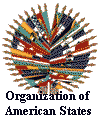Caribbean Disaster
Mitigation Project
Implemented by the Organization of American States
Unit of Sustainable Development and Environment
for the USAID Office of Foreign Disaster Assistance and the Caribbean Regional Program
|
 
|
Partnership for Prosperity and Security in the Caribbean
Caribbean/United States Summit, Bridgetown Barbados 10 May 97
5. Disaster Preparedness and Response
We recognise that the Caribbean region is vulnerable to
several forms of natural disasters including hurricanes, volcanoes, earthquakes and
flooding. This vulnerability has been compounded by the geographic situation of the
region, which makes the Caribbean Sea a transit area for many cargoes of a potentially
hazardous nature.
We also recognise the important role of preparedness and mitigation in
reducing the vulnerability of our states to such natural disasters. We pledge to continue
to coordinate our efforts and improve our ability to detect, monitor and respond to
natural disasters. We affirm the priority of investment in planning, preparedness and
mitigation initiatives, to strengthen the capacity of countries in the region to protect
themselves from disasters and to decrease the need for emergency response resources in the
future.
We therefore agree that:
- The United States will continue to assist, whenever possible, in the
provision of logistical support in disaster response, including search and rescue and the
supply of humanitarian assistance;
- Unaffected countries will give speedy consideration to assisting affected
countries in their rehabilitation process;
- The Caribbean nations will take steps to reduce damage by hurricane and
other natural disasters, by encouraging effective building design and construction
standards through the promotion of the Caribbean Uniform Building Code (CUBIC);
- The United States will provide technical assistance to support the
building of a regional capacity for conducting natural hazard assessments, integrating
these assessments into national development planning processes, establishing hurricane
models for vulnerable countries, undertaking seismic monitoring of
volcanoes—including underwater volcanoes—and training in the handling of
hazardous materials during chemical emergencies;
- The United States will assist the Caribbean in exploring the availability
and means of accessing disaster assistance programmes currently available in the World
Bank and the IDB;
- The relevant United States agencies will provide training opportunities
in areas such as the handling of hazardous materials, dealing with chemical emergencies
and disaster prediction and forecasting;
- The United States and Caribbean agencies will cooperate to develop and
promote common search and rescue protocols to govern medical evacuations, support
logistics for humanitarian supplies, and overflight in search for survivors and survey
damage;
- We will develop and support mechanisms and procedures for civil-military,
public and multi-country cooperation in planning joint exercises and mutual assistance for
response to natural and technological disasters in the region;
- We will continue efforts to maintain the Cooperative Hurricane Upper-Air
Network; and
- The Federal Emergency Management Agency (FEMA) and the Caribbean Disaster
Emergency Response Agency (CDERA) will collaborate in defining further areas of technical
cooperation.